Rising sea levels, extreme weather, melting glaciers, and the overall effects of global warming are all signs of climate change, a pressing international issue of the twenty-first century. As a result, renewable energy, sustainable heating, and sustainable cooling solutions — like solar-powered air conditioning — are critical and will be the power source of the future. You can learn more about solar energy and solar panels on our SolarPowerSystems website. And if you are already considering installing solar panels, you can calculate the approximate cost of such an installation in the get solar quote section.
Let’s look at some specific data on global change. Over the past 115 years, the average air temperature in the United States has risen by 1.8°F (1°C). This is not a small increase but a significant shift affecting our daily lives. The infographic below illustrates how this temperature rise is an annual occurrence, not a one-time event.
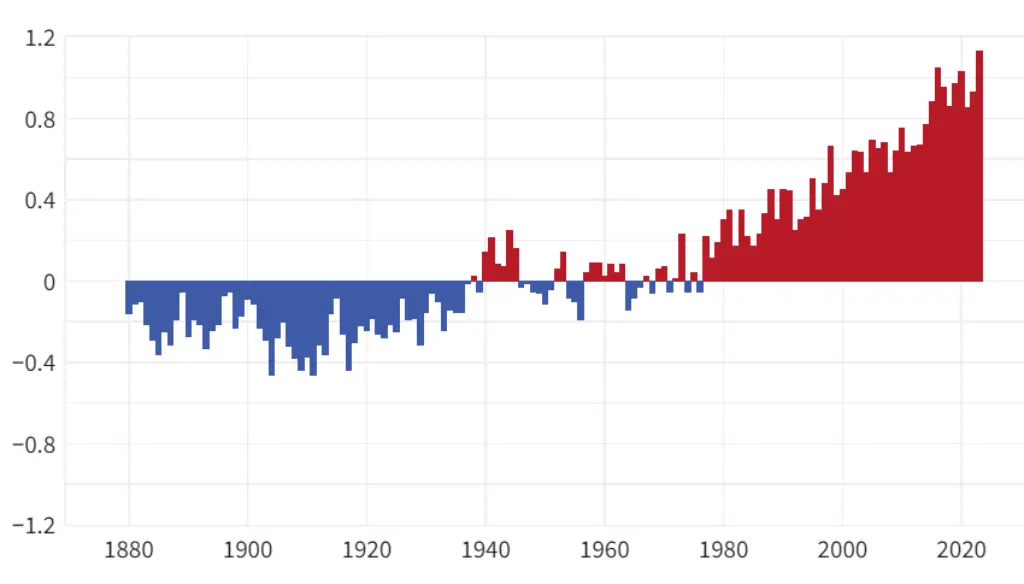
Source: NOAA Climate.gov
Temperatures are increasing everywhere in the United States. The dynamics of changes for each state are shown below. Based on a study by the United States Environmental Protection Agency (EPA), it is asserted that the North, West, and Alaska have seen the greatest temperature increases.
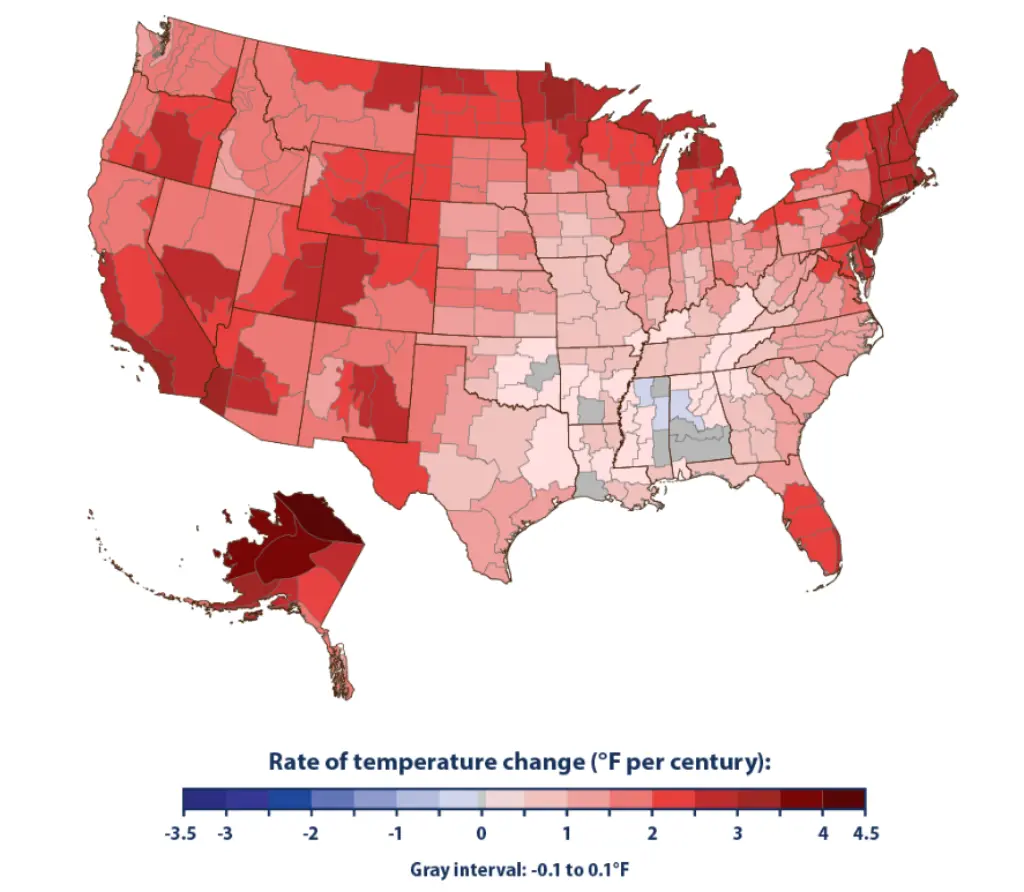
Source: EPA
As a result, many Americans are thinking of powering their air conditioning with solar energy. Here are two factors to think about if you’re still debating whether solar panels are the best option:
- Nearly 19% of Americans have solar panels installed or intend to install them at home in 2022.
- The heating and cooling industry in the United States generated about $120 billion in sales in 2023 alone.
Thus, why not use solar-powered air conditioners and install solar panels to reduce your carbon footprint? Continue reading to learn more about solar panels and solar-powered air conditioning, as well as how to assess your proficiency in air conditioning with solar energy.
Solar-Powered Cooling Systems Explained
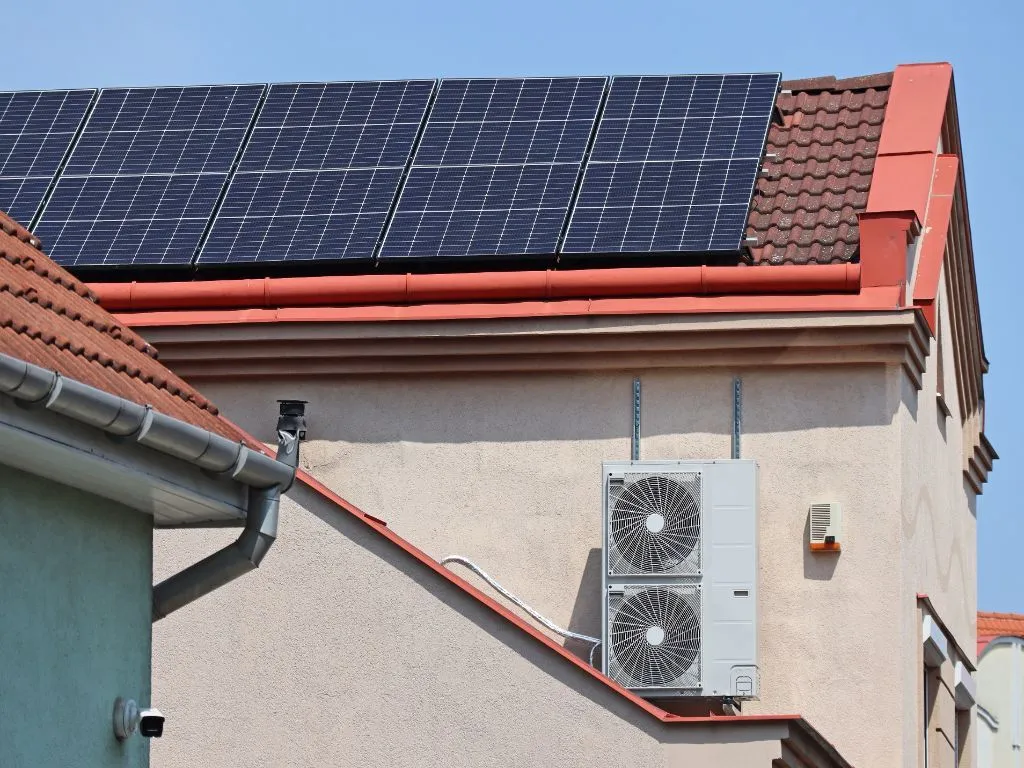
A system that uses solar panels as an energy source to heat or cool a place according to your requirements is known as solar-powered air conditioning. Its amazing feature is that it significantly reduces your air conditioning costs.
There are three primary components to the solar-powered air conditioning system:
- Solar panel
- Air conditioner
- Inverter
How exactly do solar-powered AC units function? It’s not complicated at all:
- The inverter uses the power produced by the solar panels.
- The inverter transforms it into an alternating current and is utilized to run the air conditioner.
- The solar-powered air conditioner uses the energy from the solar panels to chill the area.
Cycle of Operation of the Solar-Powered Air Conditioner
It’s crucial to realize that the air conditioner heats a liquid using solar energy, eventually heating or cooling the air in space.
The following are the primary phases of solar-powered air conditioning:
- Solar collector. The working fluid of the solar collector is heated by solar radiation.
- Evaporator. The hot working fluid is sent through the evaporator, which evaporates and absorbs heat from the surrounding air.
- Compressor. The temperature is raised by compressing the vapor from the evaporator.
- Condenser. The heated vapor travels through the condenser and releases heat into the surrounding air as it condenses.
- Expansion valve. The fluid flows through this valve, cools, and expands before returning to the solar collector.
These phases run continually throughout the air conditioner’s operation, and their effectiveness is closely correlated with the amount of sunshine.
What To Consider During Solar Panel Installation
We advise individuals who have just bought a home to put a solar-powered air conditioner on the roof to save time and money.
People who reside in places like Seattle or Portland that get little sunshine should consider installing and buying a solar battery. It will store the energy your solar panels produce, providing a backup.
Pros & Cons of Solar-Powered Air Conditioning
When it comes to air conditioners, solar-powered models are superior to traditional ones. When you use an AC solar panels, you’ll:
- Reduce greenhouse gas emissions (such as carbon dioxide).
- Reduce energy expenses as you won’t depend on the main power system.
- Becoming independent of the power grid is a great option for those who live in places with erratic energy.
Of course, solar-powered air conditioners have significant disadvantages in addition to their advantages.
- Increased solar air conditioning prices. If you already own a standard air conditioner, you may need to upgrade the solar system components if the solar system’s capacity is inadequate.
- Unpredictable solar radiation. There is no 100% assurance that the air conditioner will run at night or in overcast conditions, which may result in intermittent functionality.
Options for Solar-Powered Air Conditioning
Air conditioners are among the household appliances that use the most energy, taking anywhere from 3000 to 3500 watts per hour. In contrast, solar energy is one of the cleanest and most efficient sources. Thus, it makes sense to consider combining the benefits and features of an air conditioner that runs on solar power.
Option 1: Battery-Powered DC Air Conditioner
Your solar-powered air conditioner will receive direct solar energy, which will convert into direct current (DC) through solar panels.
If you reside in a distant location with a steady electricity supply, investing in a battery-operated air conditioner that will store solar energy for use on special occasions makes sense.
| Pros | Cons |
|
|
Option 2: Battery Powered AC Air Conditioner
Do you want to reduce your utility costs? Or are you an advocate for protecting the environment? Solar panels for AC units are a fantastic option if either of those is the case.
The solar-powered air conditioner uses the standard algorithm to run on alternating current instead of the first option (direct current air conditioner). Using an inverter, the solar system changes direct current into alternating current, and the air conditioner uses the latter to heat or cool your house.
A battery air conditioner will serve as an energy storage device to prolong the air conditioner’s operational period in dire circumstances.
| Pros | Cons |
|
|
The solar power AC unit is the most widely used. Alternating current powers most home equipment, including microwaves, washing machines, and refrigerators. This is because alternating current travels further than direct current and is thus simpler to transmit.
Consequently, speak with professionals who can evaluate your unique needs and provide guidance on solar panels for AC units.
Option 3: Comprehensive Solar System
These networked solar-powered air conditioning systems stand out for their capacity to shield you from unexpected power disruptions in the event of an emergency. It is made feasible by the automated transition between the general power grid and solar energy. The automated switching is contingent upon the sources’ current availability.
| Pros | Cons |
|
|
Make sure to take your budget, energy requirements, and local environment into account when selecting a solar-powered air conditioner.
Ensuring Proper Operation of the Solar-Powered Air Conditioner
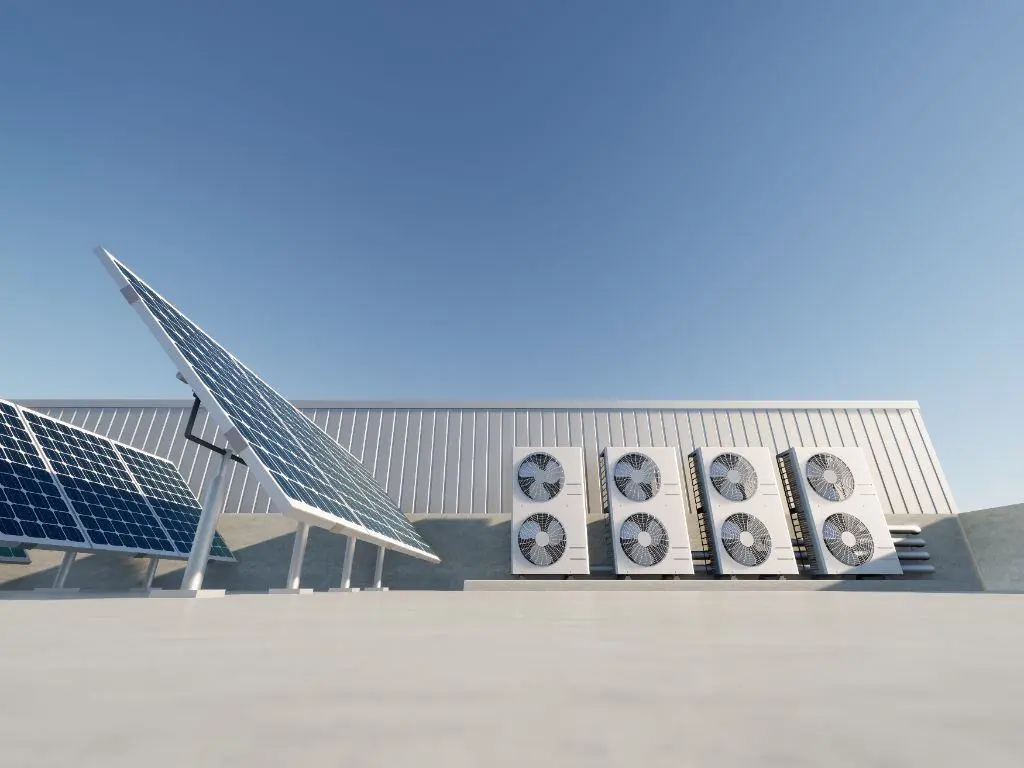
A solar-powered air conditioner requires the following things to operate properly:
Sufficient Number of Solar Panels
There should be enough solar panels to provide the energy required to run the air conditioner that runs on solar power. The quantity is determined by the wattage of the air conditioner and the amount of sunshine that reaches the panels each day.
Proper Installation of Solar Panels
The right solar panel installation ensures your panels get the most sunshine possible. It includes angle, orientation, shading, and structural soundness. The best option is installing solar panels on your home’s south side. The panels should be placed at a 30—to 45-degree angle to the horizon.
Inverter Power
Selecting a power-inadequate inverter may result in insufficient alternating current, which will affect the efficiency and performance of the solar-powered air conditioner. To maximize efficiency and control power expenses, ensure the inverter’s power equals or surpasses the air conditioner’s.
A solar-powered air conditioner will operate much better if you are in a state with regular high temperatures and plenty of sunshine.
Abide by the guidelines to ensure that the money invested in sustainable cooling solutions is used to its maximum advantage.
How To Calculate the Number of Solar Panels
If you have wondered how to calculate the number of solar panels needed to power an air conditioner, you should match the capacity of the solar panels with the air conditioner’s needs.
This formula may be used for the calculation:
Number of panels = Air conditioner power / (Average sunlight × Inverter efficiency)
For example, if the air conditioner has a power of 5 kW, the average sunlight is 5 kW/m²/day, and the inverter efficiency is 90%, then to ensure the air conditioner’s operation, you need 5 kW / (5 kW/m²/day * 0.9) = 10 m² of solar panels.
Important advice: The method is an estimate since it cannot fully account for all the individual aspects that are unique to your situation, such as the location of your home.
During your computations, take into account extra factors:
1. Air Conditioner Power
For example, you will need solar panels that produce at least 3000 W if your central air conditioner uses 3000 W of electricity. Most residential solar panels have a power output of 100–415 W. To power your air conditioner, you will thus need thirty 100 W panels or ten 300 W panels.
2. Energy Consumption by the Air Conditioner
According to a U.S. Energy Information Administration poll, about 90% of Americans used an air conditioner in 2020. An ordinary portable solar power air conditioner consumes 500 Whr, a medium one consumes 900 Whr, and a big one consumes 1440 Whr. Home air conditioning costs may increase to 3000 W·hr, particularly during the summer.
3. Air Conditioner Tonnage Rating
This rating determines the amount of heat that an air conditioner can remove in an hour. The greater the air volume the air conditioner can cool, the better the rating. Select a tonnage rating of 2-3 for rooms under 20 m², 3-5 for rooms between 20 and 40 m², and 5-7 for rooms 40 m² and larger. If the tonnage rating is insufficient, the air conditioner will operate constantly, raising the cost of power.
Use the online calculators found on the websites of many solar system manufacturers to estimate the number of solar panels needed for a solar-powered air conditioner more precisely. Alternatively, ask a qualified solar panel air conditioner installation for help.
Cost of Air Conditioner in 2024
An air conditioner that runs on solar electricity might cost between $2000 and $5000. Despite the hefty cost, it is warranted since future savings from lower utility costs will make up for it. The AC will pay for itself in ten to fifteen years.
The price of a solar-powered air conditioner is influenced by several variables, such as:
- The air conditioner’s kind, size, power, and energy efficiency class.
- State where you bought the air conditioner and its manufacturer’s reputation.
Examine offerings from several providers while considering your alternatives to ensure they fit your demands and budget.
Is Solar-Powered Air Conditioning Truly Effective?
Solar energy is becoming increasingly affordable, so using it to run the air conditioner will reduce your family’s budget.
Solar panels may power a small solar-powered air conditioner and bigger machines. But for this to happen, there has to be enough sunshine, and the solar panel needs to be powered appropriately.
Solar-powered air conditioning is nonetheless a practical option for your house.
Because of this, many people in the United States are considering utilizing solar energy to power their air conditioning systems. Suppose you are one of these people who have decided to use solar energy in your home but are still determining where to start. In that case, you can read other articles in our blog about incorporating solar energy into sustainable living practices or contact our professionals for a solar energy quote.
Conclusion
As climate change intensifies, investing in renewable energy solutions like solar-powered air conditioning becomes increasingly important. These systems offer significant advantages, including reduced greenhouse gas emissions, lower energy bills, and greater independence from the power grid. However, the initial costs can be high, and the efficiency depends on the availability of sunlight.
It’s crucial to consider factors such as the size of the air conditioner, the number of solar panels required, and whether battery storage is needed. Consulting with professionals and using online calculators can help determine the best setup for your needs. Solar-powered air conditioning is a viable and sustainable option that contributes to environmental conservation and long-term financial savings despite the potential challenges. As technology advances and solar energy becomes more affordable, this eco-friendly solution will likely become a standard feature in homes worldwide.

